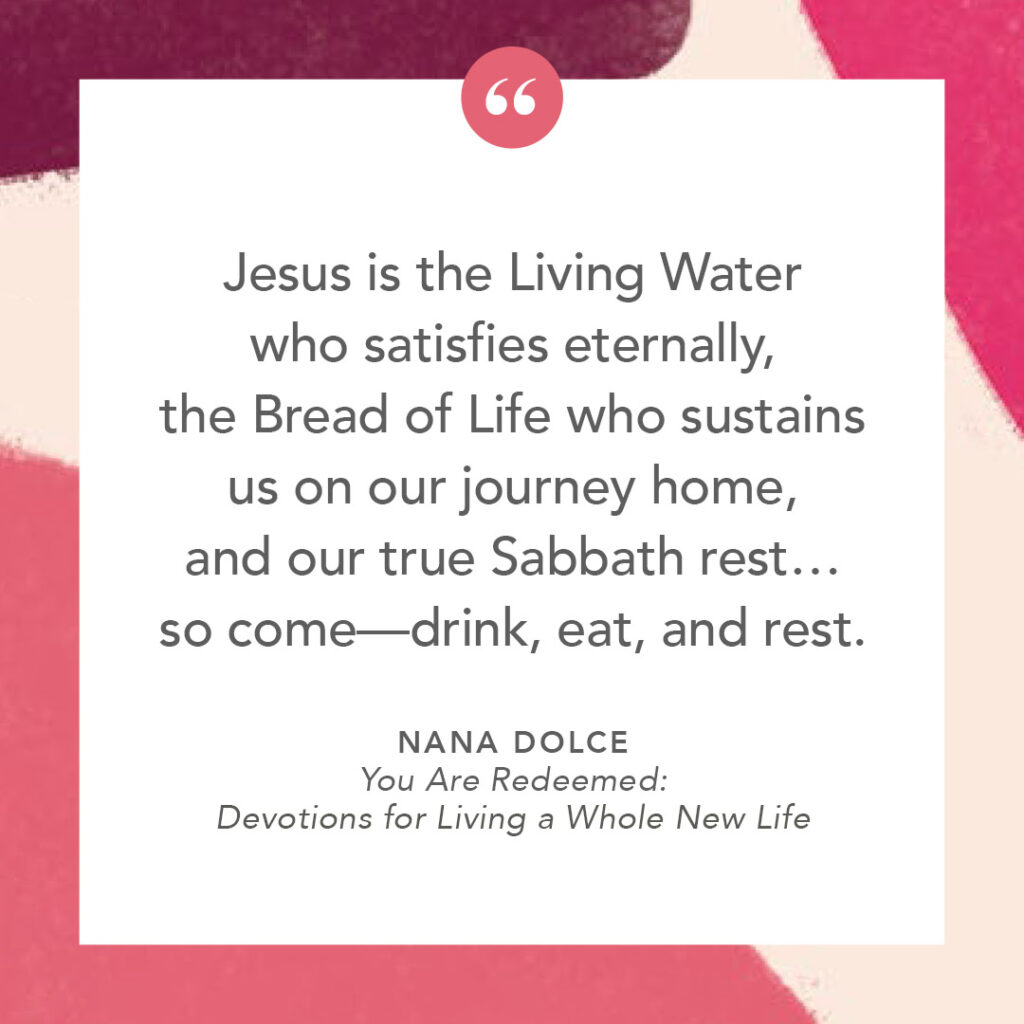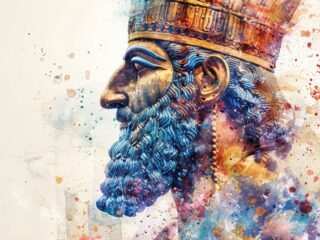What does God’s abiding presence mean in moments of pain? Does he sympathize with us? Where is true rest in a world of stress and suffering? These are good questions, and our redemption in Christ speaks to every one of them. In You Are Redeemed: Devotions for Living a Whole New Life, Nana Dolce helps women see how God, in his Word, draws near to make himself known.
Dolce’s 40-day devotional journey through the book of Exodus leads readers in experiencing how the same God who lived among his people long ago is still present today—guiding, helping, listening, delivering, and redeeming. At the beginning of each day, she shares a mix of relatable modern-day and historical stories, then ties them back to the experiences of the Israelites to better understand how the book of Exodus is relevant to Christians today.
Learn more in this interview with Nana Dolce.
Q: Why is Exodus, which tells an epic story so different than anything we have ever experienced, so relevant to Christians today?
The book of Exodus is relevant for Christians today because what began in Exodus has its complete fulfillment in Jesus, our great Redeemer. The 66 books of the Bible, taken together, tell the unfolding story of redemption. Each book contributes to the big story of Scripture. Exodus is a glorious book in the story God is telling about his people—and ultimately about himself. In Exodus, we see a powerful Redeemer who draws near to redeem his people—not only for freedom but for adoption. God delivered Israel for himself. He’s done the same for you and me in Christ. Yet our redemption comes with far greater glory!
You see, access to God’s presence in the book of Exodus was awesome, but it was also a temporary system with strictly defined roles and boundaries. Certain people approached God on specific occasions, and often at a distance. This picture in Exodus has its complete fulfillment in Jesus Christ—the Son of God who came in the flesh to dwell with humanity and is preparing a place in God’s heavenly house for his church (John 14:1–3). In Christ, you are welcomed, not to stand at a distance near Mount Sinai, but to feast with God and all his people on Mount Zion (Hebrews 12:18–24)!
Q: How does Exodus address our fears and anxieties? How does it strengthen our faith in Christ?
We find the theme of fear in the very first story of the book of Exodus. We meet two women who should have been afraid of a powerful king. Shiphrah and Puah were enslaved midwives living in Egypt. They lived under the rule of a crafty pharaoh. He’s like a serpent in this story. He’s determined to swallow Israel. He commands Shiphrah and Puah to be his agents of death. These lowly women should have feared the serpentine pharaoh (and no doubt they were afraid). Yet Pharaoh held no ultimate power over them because they feared a King on a higher throne. The midwives honored God by defying the ruthless pharaoh.
The first chapter of the book of Exodus teaches this truth: To fear God is to revere him—to regard his unmatched supremacy and faithfulness above all. Know this: the fear of God frees you from control of other fears. If fearing God could free two lowly women from the control of a genocidal ruler, then surely our reverence for God can crush our lesser fears! Let’s walk in freedom with God’s help, knowing that Jesus has redeemed us from fear to revere him above all.

Q: The first week reveals how God remembers his promises. When life becomes dark and difficult, what are some of God’s promises that we should remember?
The God who revealed himself as I Am to Moses in Exodus 3:14 is with us through his Son. Jesus promises to never leave us nor forsake us, he’s with us in every dark and difficult season. We have a knowing friend in Jesus. He became flesh and walked the road you’re on—without sinning. Hebrews 2:17 explains that Jesus “had to be like his brothers and sisters in every way, so that he could become a merciful and faithful high priest.”
Our Redeemer is a merciful and knowing high priest. He experienced physical pain, rejection, betrayal, and bereavement. Jesus can even sympathize when your fervent prayers return to you with a divine no. He faced the horrors of the cross despite his pleas in the garden (Luke 22:42). Our Redeemer knows our language of grief. In Jesus, we have a brother who hears, sees, and understands our sorrows. But even better, Jesus is the fulfillment of every covenant promise of God. He can sustain you in those promises amid your darkest pain. So draw near to him today.
Q: There are events within Exodus that very much point to the redemption that is to come, for example, the final plague and Passover. Could you share a little bit about those glimpses of redemption and any others found in Exodus?
God announces the final tenth plague in Exodus 12:12–13. He would pass over Egypt by night to strike every firstborn son of the land. Israelites would be spared from this terrible judgment because lambs would die in place of their firstborns. God tells Israel to remember this salvation on the fourteenth day of the first month. It would be the Feast of Unleavened Bread or the Passover. Salvation belonged to God alone, remembrance of God’s faithfulness belonged to his people. This truth stands for Christ’s church today.
It was this Passover Jesus was celebrating when he instituted the Lord’s Supper (Luke 22:18–20). He became our Passover Lamb. His body was broken for us, and his blood was poured out for the forgiveness of sin. God’s judgment passed over us because Jesus died in our place. The work for our salvation belonged to Jesus alone. Our part is to remember what Jesus did. If you’re like me, then celebrating the Lord’s supper, communion, can feel a bit routine at times. God called Israel to remember their salvation from Egypt in Exodus 12:14. Jesus calls his church to remember our salvation through his sacrifice in Luke 22:19. May we not fail to remember…and worship!
Q: Why was it important to God for the Israelites to observe the Sabbath? Though not a requirement of us as Christians, why is it important that we still take time for rest?
God called Israel to rest because, unlike the Pharaoh who demanded bricks without giving straw, God isn’t a slave master. He had seen the affliction of his suffering people and heard their groaning. He came to grant them rest.
The God of Israel is a faithful Father who provides his children with daily bread—and weekly rest. He told Israel to gather a double portion of manna on the sixth day of the week. They would eat half and save the remainder for the seventh day. Amazingly, this preserved Sabbath meal stayed fresh with no maggots or rot. Israel was free to be still on the Sabbath, eating and resting.
Sabbath rest for the Christian isn’t a legalistic checklist of dos and don’ts but instead is a restful trust in the One who upholds all things—including us. Our Lord calls the weary to come to him for rest—rest from working to save ourselves, rest from the burden of our sins, and rest in his care so we don’t think we have to accomplish all our tasks on our own. Jesus is not a taskmaster but a gentle and lowly Redeemer.
Q: The longest speech in Exodus reveals God’s desire to dwell with his people. How can this truth encourage us as we draw nearer to God today?
It’s been said that the mouth speaks what the heart delights in (Luke 6:45). The drama of the Exodus pauses from chapters 25–31 as God takes the microphone. He speaks for seven straight chapters! God’s long speech reveals his heart for his beloved people. He rescued and set Israel apart to live with him!
Moses is the storyteller in the book of Exodus, but the plot is God’s. And the heart of this narrative shows a Redeemer who comes to reside with his people. God speaks to prepare his sanctuary among his redeemed. He meets with Moses to provide specific instructions for the pattern of the tabernacle and the ministry around it. He gives precise numbers, types of materials, and names of those he wishes to employ to his service. Yahweh’s words carry the authority of a Father who is building a house to dwell with his children (Exodus 29:45–46).
As it was with Israel, God’s plan has always been to dwell with you! What we find in the story of the Exodus is true for the entire story of Scripture—God intends to live with his people! In time, God would prepare a much better tabernacle—the body of his own Son (Hebrews 10:5, 10). Jesus took on flesh and came to “pitch his tent” on earth (John 1:14). He came to temporarily abide—but eternally redeem. He offered up his flesh for our redemption. Christians dwell with God through his Spirit today—and will see him face-to-face one day. Remember this sweet truth as you draw near to your Redeemer today.
Q: How do we see both God’s unwavering justice and his glorious mercy through the death and resurrection of Jesus?
There’s a passage in Exodus that helps us to answer this question: Exodus 34:6–7 describes God in an incredible way, it says: “The Lord, the Lord, a God merciful and gracious, slow to anger, and abounding in steadfast love and faithfulness, keeping steadfast love for thousands, forgiving iniquity and transgression and sin, but who will by no means clear the guilty, visiting the iniquity of the fathers on the children and the children’s children, to the third and the fourth generation.”
These verses are essential to the Bible’s teaching on God’s nature. This is who God is—according to God! The Lord is a merciful and gracious God who forgives sin but will by no means clear the guilty. This is the God who rescued Israel to make himself known to her. God’s self-description is foundational to our understanding of the gospel! God’s mercy and justice meet ultimately in Christ. The Judge who will by no means clear the guilty showed stunning grace and steadfast love to sinners when he delivered his own Son to death for our sins and raised him to life for our justification (Romans 4:25). God reveals his nature perfectly through Christ—unwavering justice is satisfied by glorious mercy. We should share God’s self-description with many!

Q: You write in the book that God redeemed Israel, not for freedom alone but for himself. They were rescued for adoption. How has God done the same for those in Christ?
God says this to Israel in Exodus 19:4—“You yourselves have seen what I did to the Egyptians, and how I bore you on eagles’ wings and brought you to myself.” Like an attentive momma eagle, God flew Israel away to her freedom. Yet God’s people were rescued for something greater than freedom itself. They were redeemed for adoption. God brought Israel to himself. The nation didn’t earn her place with God—she was simply claimed.
Exodus 19 is the chapter immediately before the Ten Commandments. God rescued enslaved Israel before giving them his law. The Israelites didn’t earn their salvation through obedience. Yes, God would call his people to be holy, but he redeemed them first. Similarly, we don’t obey God to become his children. Rather, in Christ, our Father delivers us from our enslavement to sin to become his own: “a chosen race, a royal priesthood, a holy nation, a people for his own possession” (1 Peter 2:9). He claims us first, and then he gives us his household rules, along with his Spirit, to enable our obedience. That’s good news!
Q: What final piece of encouragement would you like to share with women about living redeemed?
Moses wrote and spoke to encourage his audience to trust in the God who remembers, redeems, provides, covenants, reveals, judges, restores, prepares, and dwells with his people. Moses told the story of Exodus to guide a young Israel to the treasures of faith in Yahweh. He wrote with his eyes on his original audience, but the Divine Author spoke to instruct you (1 Corinthians 10:11). The story of the Exodus was inspired and inscribed to guide you to the treasures of faith in God the Father and his Son, our Redeemer. We have been saved from the bondage of sin by the shed blood of that Son. God has delivered us—not for freedom alone, but for himself. We are God’s new covenant people; God’s Presence dwells among us now, and one day, we will see him face-to-face. Sister, God’s Spirit uses God’s inspired Word to guide us throughout all our journeys to a promised eternal home. May we follow well!
You Are Redeemed
In You Are Redeemed, Nana Dolce takes women on a 40-day journey through the book of Exodus, helping them see how God, in his Word, draws near to make himself known. You will experience how the same God who lived among his people long ago is still present today—guiding, helping, listening, delivering, and redeeming.






